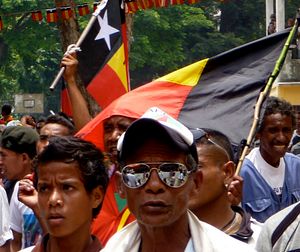ASEAN aspirant Timor-Leste is being democratically tested today, with new elections slated after the minority government formed just last year failed to get its budget and policy platform passed by parliament.
But while headline writers and publishers are using this to question the merits of democracy and the government of President Francisco “Lu-Olo” Guterres, the reality is this exercise is also thoroughly refreshing in a region where democracy is on the skids.
That’s not to say that Timor-Leste’s democracy is a state of utopia – far from it. But when compared with most of the rest of ASEAN, the government in Dili has credentials that the rest of Southeast Asia pays only lip service to.
Of the ten nations in ASEAN, Vietnam and Laos remain one-party communist states, while Singapore and Malaysia have never been tested by a change of political parties in government.
Move on then to consider the state of democracies in the region: Thailand has endured a coup and broken promises over election dates, while the election of President Rodrigo Duterte has seen repeated attempts to undermine democracy in the Philippines.
The list goes on. In Cambodia, the opposition has been dissolved. In Myanmar, elections and a change in government have failed to curb military control and raised fundamental questions about the state of its people. Brunei has witnessed some troubling trends despite some cosmetic changes of late, including the introduction of Shariah law.
So when Guterres said, “I ask the people to vote again. We will all go to vote. We will all go to elections to improve our democracy,” this was refreshing for those used to these bleaker stories elsewhere around the region. It was a far cry from the threats of war and social turmoil used by leaders elsewhere to justify power grabs and the entrenchment of ruling elites.
Guterres bowed after critics claimed his minority government was unconstitutional, with the 2018 budget rejected by parliament in December and his policy program gone unaccepted in October.
Fresh elections were also backed by the two biggest parties in parliament, Fretilin, which led the minority government, and the National Congress for Timorese Reconstruction (CNRT).
That came on the heels of last year’s election, the first unsupervised round of polls held since UN peacekeepers left in 2012, which failed to deliver a decisive victory. Fretilin secured 23 seats, with the CNRT, led by independence hero Xanana Gusmão, coming in a close second with 22 seats.
But the poll was hailed as a tremendous success in this long troubled country with a history of just 16 years and just around 1.3 million people, who turned out in large numbers to vote.
As one observer noted for The Diplomat:
From blogs, Facebook, public forums, and community spaces across Timor-Leste, the public sphere has been vibrant and dynamic during the election season. This is an indication of a popular interest in Timorese politics among its people. Public discourse is now much more important in the country than it was during the past.
Meanwhile, even as Timor-Leste’s record on democracy is much better than that of its Southeast Asian peers, its admission to ASEAN has been repeatedly delayed. Dili submitted an application to join ASEAN in 2011, when Indonesia took its turn as chair of the group, and member countries agreed to undertake a feasibility study. Yet progress has been much slower than originally intended, even if it might eventually occur.
Some might argue that the current political stalemate reinforces the point about needing to be cautious before accepting Dili’s attempt to join ASEAN. But these issues are surely trifling affairs when considered in light of issues and delays that occurred when Cambodia, and to a lesser extent Vietnam, Myanmar, and Laos, which finally joined in the 1990s.
There are no guarantees that fresh elections will resolve the current political stalemate in Timor-Leste. But its ability to work through the democratic process in a region where political stability is under threat by politicians seeking to subvert democratic values should be seen as a big step by a small country with a troubled past in the wider-world.
Luke Hunt can be followed on Twitter @lukeanthonyhunt. He is also the author of a new book: Punji Trap – Pham Xuan An: The Spy Who Didn’t Love Us.

































